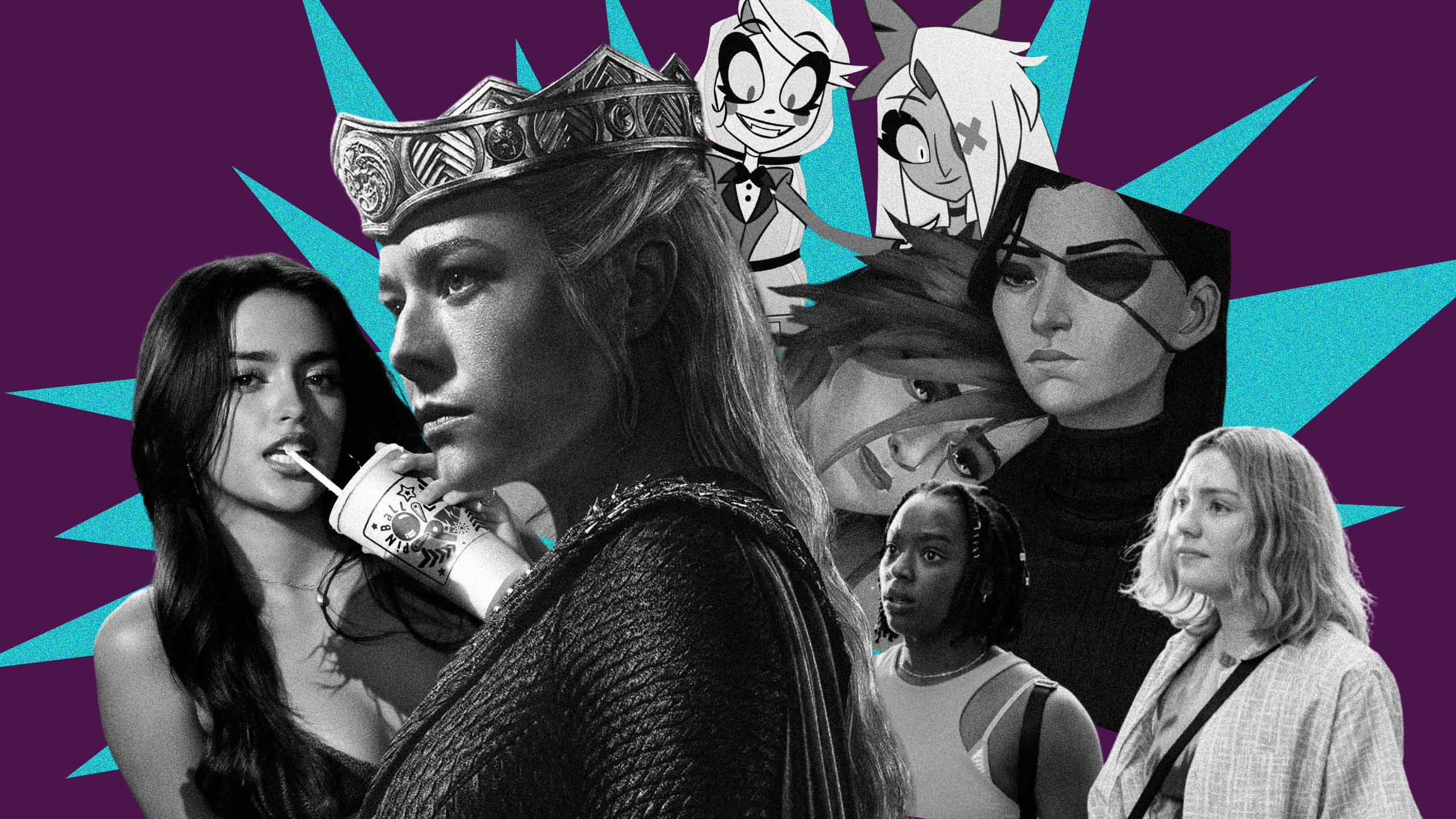This year was one of many movements. The obvious ones come to mind: the epic rise of Chappell Roan, Brat summer and the phenomenon of “hot rodent boyfriends,” a surprising amount of throuples (I see you Challengers and Doctor Odyssey), whatever it means to “hold space.” But one thread running through 2024’s pop culture zeitgeist that has flown spectacularly under the radar has been this year’s commitment to toxic Sapphic relationships onscreen—and what this delightful influx of queer women who love and hate each other by turns means for this specific television and film moment, and how the future’s uncertainty only magnifies its importance as a year-long exercise in Sapphic catharsis.
For the past two years, media watchdog group GLAAD has reported that queer characters are dropping like flies on television. Their annual “Where We Are on TV” report, which tracks the number of LGBTQ2S+ characters on TV across broadcast, cable and streaming, lamented the loss of 36 percent of television’s queer representation. This second consecutive drop-off has been attributed to an outsize number of cancellations featuring queer characters, with queer women suffering the most: 53 percent of LGBTQ2S+ characters on cancelled shows are women. And the tune is the same across film, with the Geena Davis Institute reporting that LGBTQ2S+ characters make up just 1.5 percent of film roles within the studies’ unfortunately narrow parameters—for example, R-rated films weren’t considered (thus leaving out Love Lies Bleeding and its peers), but the depressingly small amount of space the community holds on the silver screen still stands. It’s these harrowing and disheartening statistics that make 2024’s unexpected influx of complicated, messy relationships between equally as complicated and messy women all the more thrilling and refreshing.
Notorious serial-killing witch Agatha (Kathryn Hahn) of Marvel Studios’ WandaVision spinoff Agatha All Along is simultaneously smarmy and warm, continually manipulating those around her to meet her own ends, including her ex-lover Rio (Aubrey Plaza). The centuries of history (including a tear-jerking flashback to the loss of their child) paired with their present bloody knife fights and tender hugs allow this couple to become Marvel’s most compelling duo across just nine episodes. In HBO’s all-consuming banger House of the Dragon, Rhaenyra (Emma D’Arcy) finally explores her queerness, kissing her advisor and expressing her desire to step into her husband’s shoes, but it’s the series’ final reunion between her and her childhood-best-friend-turned-stepmother Alicent (Olivia Cooke) that electrifies the second season’s finale. Alicent all but allowed Rhaenyra free rein to kill her son in exchange for her freedom, and begged her former childhood friend to run away with her; the rich undertones of love soured by duty and sacrifice elevates the series’ politicking and war-torn heartache. In Pretty Little Liars: Summer School, Noa (Maia Reficco) and Jen’s (Ava Capri) controversial coupling saw the former breakup with her well-meaning boyfriend for her past jailbird lover; Arcane’s Vi (Hailee Steinfeld) and Caitlyn (Katie Leung) fight and reunite across Season 2’s structured “acts” as they find themselves on opposite sides of a terrible war—and these couples just barely scratch the surface of 2024’s Sapphic offerings.
But even just beyond the feat of simply appearing on screen and having the gall to exist outside the bounds of palatable, positive representation, these women are the main characters of their respective movies and shows. From the enabling spiral at the centre of A24’s Love Lies Bleeding (and its serendipitous lesbian road-trip double-feature counterpart Drive Away Dolls) to the centuries-long on-again off-again relationship driving Marvel Television’s smash hit Agatha All Along, this year’s queer media has allowed these heroes, antiheroes and villains alike the luxury to be just as horrifying and heartwarming as their heterosexual counterparts. Where the Walter Whites of TV seasons past ruled the airwaves and Patrick Bateman and his endless copies dominated silver screens across the country for far too long, Sapphic women have now picked up the complex antihero baton, positing that queer women in these roles are just as viable, relatable and entertaining as any similar examination of straight characters—if not even more so.
Bloody fights, infidelity and screaming matches do not make these relationships and characters admirable, but they mark a clear evolution in how creatives are willing to portray the Sapphic community, and, in turn, how queer audiences are just as willing to embrace these messy, dynamic leads in the aftermath of so much proverbial slaughter. For years, hand-wringing about the notion of “positive representation” has made television and film creators gun-shy in telling queer stories, with many series having been on the receiving end of fan backlash in the past. From Riverdale’s heartfelt attempt at a conversion therapy storyline being loudly rejected for its detraction from Cheryl Blossom’s (Madelaine Petsch) previously “positive” storyline, to questions surrounding the value of characters like Killing Eve’s villainous Villanelle (Jodie Comer), the years following the 2017 “massacre” of LGBTQ2S+ characters on TV felt like an overcorrection, moving representation away from reality and toward one-note, safe depictions of idealized queer side characters in the middle of decidedly not idealized fictional worlds.
But now, with so much representation being pulled out from under the community, it’s striking that some of the year’s standout characters push against established systems, have no shame in their wicked ways and move through their lives confidently and assuredly. Like their infinitely unrestricted heterosexual and male counterparts, queer women are now finally allowed to be just as audacious, cunning, cruel and loving as the complex characters they’ve often played second fiddle to across television and film.
These complicated women and their equally complicated love lives aren’t role models to aspire to, but their stories of perseverance, redemption and love against all odds provide tangibility that was lost in an effort to make queer characters palatable beacons of morality. We see ourselves in Agatha and Rio because we all have that one person whom we can’t stop simultaneously loving and hurting; we understand Rhaenyra and Alicent because the systems in place in the distant world of Westeros are strikingly similar to our own. We mourn youths alongside Sweetpea’s Rhiannon (Ella Purnell), we betray those closest to us like Heartstopper’s Imogen (Rhea Norwood), we trust the wrong person like The Girls on the Bus’ Lola (Natasha Behnam).
And even in the midst of all this toxic chaos, the few series that embraced a less brutal approach to Sapphic storytelling still managed to bring a captivating depth to these characters. Heartstopper’s Darcy (Kizzy Edgell) and Tara (Corinna Brown) are tooth-achingly sweet, but still have the warm, emotional conversations granted to the series’ gay male and straight couples. Hazbin Hotel’s queer leads Charlie (Erika Henningsen) and Vaggie (Stephanie Beatriz) push through a brief disconnect to remain the series’ steady anchor.
These portrayals of mundane relationship evolutions and breakdowns may not feel revolutionary in comparison to their counterparts on both the large and small screens, but the valiant triumph of these winning swings between love, loss, hate and heartbreak only elevate the status of Sapphic fictional characters, bringing us ever closer to the representation we may not have always wanted, but clearly desperately needed.
In an industry that has only shrunk over the past few years and is now preparing for what will likely be a restrictive and harmful upcoming U.S. presidency, 2024’s capsule of Sapphic depravity feels like nothing short of a miracle. While the continued cancellations of lesbian series and Hollywood’s potential conservative swing lingers just on the horizon, this special, unexpected year in which so many of our leading ladies were refreshingly nasty (and unequivocally awful girlfriends) will linger, hopefully as an aspirational model to follow in queer representation’s long future ahead.


 Why you can trust Xtra
Why you can trust Xtra


